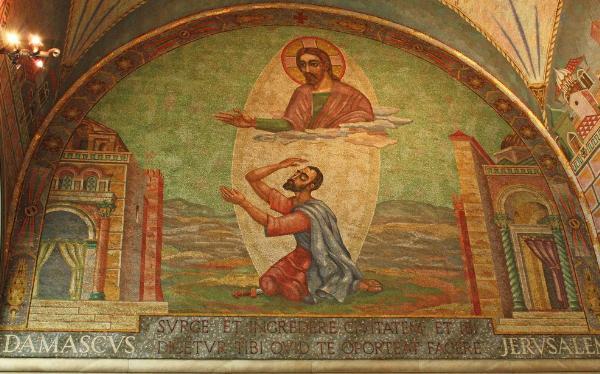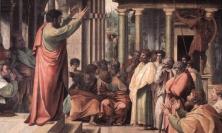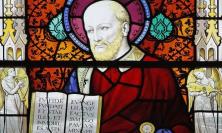Today we celebrate the Feast of the Conversion of Saint Paul, the event in which the ‘most ferocious enemy of the Church became its most zealous son and missionary’. How is Paul’s conversion described in the New Testament, in his own words and in the accounts in the Acts of the Apostles? Marcel Uwineza SJ looks closely at how Paul and Luke portray the change affected in Paul on the Damascus Road.
On 25 January each year, the Church celebrates the Feast of the Conversion of Saint Paul. The accounts of the experience according to Luke in the Acts of the Apostles, and the details offered by Paul himself in his epistles, are varying and give us much information about the ‘conversion’ we celebrate, as well as raising many questions about the event and what it meant for Paul. In this article I will look at what we can learn from each account of Paul’s conversion.
Paul in his own words
‘To understand the importance of the Damascus experience as conversion, in the proper sense of the word, it is necessary to briefly look at what Paul was before it and what he became after it.’[1] What was it that Saul objected to about Jesus and his followers? What were the circumstances that led Saul to persecute the Church?
Paul was ‘circumcised on the eighth day, a member of the people of Israel, of the tribe of Benjamin, a Hebrew born of Hebrews; as to the law, a Pharisee; as to zeal, a persecutor of the Church; as to righteousness under the law, blameless’ (Phil 3:5-6). It was the scandal of the cross that compelled Paul to act against Jesus’s followers: he could not imagine that an acclaimed Jewish Messiah should have been put to death by crucifixion on a Roman cross (1 Cor 1:23; Gal 5:11). ‘Nowhere in the orthodox of the Torah was there room for a crucified Christ.’[2] Paul’s persecution of Christians was entailed by his Jewish understanding of the Messiah: he was waiting for the Anointed One – the Messiah – and he could not tolerate the fragmented loyalties that were taking place within the nation with the rise of a new sect that looked to Jesus as the awaited Messiah.[3] Paul had a firm commitment to the Jewish religion and his wholehearted acceptance of the Pharisaic interpretation of that religion.
Paul’s own letters can help us understand what he became after his conversion experience. One thing is clear: ‘Paul tells us little about himself. He is not self-preoccupied, self-reflective, introspective, or narcissistic.’[4] He refers to his experience only in contexts where he is addressing other issues: in defending the Gospel he proclaimed to his Gentile converts in Gal 1:13-17; in countering certain ‘supra-spiritual’ believers who were attempting to denigrate him in 1 Cor 9:1 and 15:8-10; and in rebutting certain Jewish Christians who were trying to ‘judaize’ his converts in Phil 3:4-11. But in these indirect references, does Paul set out the essential feature of his conversion?
In 1 Cor 9:1, Paul says that he has ‘seen Jesus our Lord.’ In 1 Cor 15:5-7, he puts what he saw on a par with all of Jesus’s post-resurrection appearances, whether to Peter and ‘the Twelve’, or to five hundred believers, to James, or to all the apostles. Yet what Paul experienced was of the nature of revelation (Gal 1:11-12, 16a): Christ was the agent of that revelation (Gal 1:12); the content of that revelation was God’s Son; and the ultimate purpose of his revelation was ‘so that I might proclaim him among the Gentiles’ (Gal 1:16). Christ’s appearance had a revolutionary effect on his life. He came to consider ‘everything as loss compared to the surpassing value of knowing Christ Jesus my Lord’ and to focus only on ‘knowing Christ’ with all that such a consuming passion involved (Phil 3:7-11).
Paul never refers to his own experience as a ‘conversion’. In fact, in his letters, there is no clear mention of a trip to Damascus and no narrative detailing what took place, as there is in Acts, as we shall see. There is ‘no light, no voice, no companions, no Ananias to interpret the significance of it all.’[5] However, the descriptions in Galatians (1:13-17) and Philippians (3:4-7) suggest that what Paul experienced was a change of commitment, values and identity that was sudden and unexpected. Is this what we mean by ‘conversion’?
Paul makes no reference to terms such as repentance or turning or conversion in relation to his own experience, although he uses the verbs ‘to turn’ and ‘to believe’ with respect to the reception of the Gospel by others (2 Cor 3:15-16, 1 Thess 1:9-10) and the verb ‘to be transformed’ in admonition to believers (Rom 12:1-2). In Gal 1:15, that God‘set me apart before I was born and called me through his grace’ suggests the experience might have been less a conversion and more a call to a particular service – his Gentile mission, which compares to the call of Old Testament prophets (Jer 1:5) and the servant of Yahweh (Isa 49:1-6). From the letter to the Romans, Paul’s life is seen as ‘set apart for the Gospel of God, which he promised beforehand through his prophets in the Holy Scriptures… to bring about the obedience of faith among all the Gentiles for the sake of his name’ (Rom 1:1-5). These Pauline verses follow a pattern: ‘the call, the response and the mission’[6], just like the calling of Jacob (Gen 46:2-3) and the call of Moses (Ex 3:4, 10).
While there may be intimations in Paul’s letters, then, that his experience was in some ways a ‘call’, the event we celebrate today is the conversion of St Paul. So if we understand his experience in this way, we can ask: from what and to what was Paul converted? Paul’s experience ‘was certainly not that of the religiously destitute. It was not the conversion of someone who had nothing and came upon unexpected riches.’[7] Paul was proud of his belonging to the people of Israel, his being a Hebrew born of Hebrews, his Pharisaim, his zeal for the law and his blamelessness under it (Phil 3:5-6). ‘The incident on the way to Damascus, judged by what Paul himself says about it, was a conversion, a complete turning away from what was genuinely good to its everlasting enemy, the better.’[8] Paul’s experience was not like that of Mary Magdalene, or the bitter tears of a remorseful Peter after denying Jesus, or the repentance of the good thief. What Paul possessed and what he was ‘before was neither bad nor nothing. It was simply ‘loss’ or, as he himself more boldly says, ‘refuse’ [rubbish] (Phil 3:8).’[9] Paul’s conversion was different: its starting point was not the valley of humiliation, ‘but the high plateau of pride in genuine achievement.’[10] In summary, the essence of Paul’s conversion is that ‘all he was, all that he had achieved, all that of which he was justly proud and in which he could rightly boast, he now counted as ‘refuse’ … Whatever happened to Paul radically reversed the scale of his values and made his vision of all things utterly new.’[11] This was his conversion.
Paul’s conversion in the Acts of the Apostles
Does the Acts of the Apostles paint a different or a similar picture of Paul’s conversion experience than do his letters? There are three accounts in Acts 9, 22 and 26. Scholars argue that this is significant in that Luke ‘employs repetitions only when he considers something extraordinary and wishes to impress it memorably on the reader.’[12]
In chapter 9, we have a straightforward narrative in the third person; in chapter 22, an testimony by Paul himself to his fellow Jews; and in chapter 26, a formal defence by Paul before King Agrippa and Festus in Caesarea. There are some important common points in the three accounts:
- Paul persecuted the people of the Way (Acts 9:2; 22:4; 26:10);
- Christ is the one who brought about Paul’s Gentile ministry. It was not a plan of Paul or a task given to him by another. His mission came directly from Christ, just as he commissioned the Eleven in Acts 1:4-8;
- The location of the event: Paul was ‘approaching’(Acts 9:3; 22:6) or ‘travelling to’ (26:12) Damascus.
In the first account (Acts 9:1-9) Paul insists that he actually saw the Risen Christ. This is important because it was Paul, not any of the original apostles, who would carry out Christ’s explicit instruction to bring the Christian message out of the confines of Israel, thus realising its universal nature; and Paul’s insistence that he saw Christ put him on equal footing with the other apostles.
The purpose of the second account (Acts 22:3-11) is to show that Paul’s eyes become blind for a reason. The cause of Paul’s blindness is not just because of the light he saw: the Greek word for the cause of his blindness is sometimes translated as ‘brightness’ but more often as ‘glory.’ The expression that Paul saw the ‘glory of the light’ indicates that, ‘the Christ revealed to Paul on the Road to Damascus was not just the Christ of post-resurrection appearances, but the Christ exalted at the Father’s right hand. The vision of the exalted Christ rendered Paul sightless.’[13] This was what is called ‘theophany,’ the appearance of the glory of the Lord, like those to Abraham, Jacob and Moses. In fact, ‘It is a Lucan characteristic to reserve the appearances of the risen Lord specifically – perhaps even exclusively – to the Twelve (see Lk 24 and Acts 1:3-4).’[14] The description in this second account is also a Lucan way of expressing Paul’s helplessness in the face of divine action: God is irresistible. Prophets attest to this truth; Jeremiah speaks of God’s action upon him as enticement (Jer 20:7). Paul’s Damascus experience turned his life upside down and inside out. The most ferocious enemy of the Church became its most zealous son and missionary.[15]
The third account (Acts 26:12-18) is an attempt to portray Paul as a prophet and to prove that his mission is the extension of the mission of the servant of God in the book of Isaiah. Luke insinuates that the Damascus event is to be considered as Paul’s inaugural prophetic vision. Like Ezekiel, Paul is asked to stand up, for the Lord has appeared to him for the purpose of appointing him as a servant and witness to the Gentiles, just like Ezekiel is asked to stand up and is sent to the people of Israel (Ez 2:1-3; Acts 26: 16-17). Paul is also sent, ‘to open their eyes that they may turn from darkness to light and from the power of Satan to God’, just as in Isaiah: ‘A light to the nations, to open the eyes that are blind … I will turn the darkness before them into light’ (Acts 26:18 & Is 42:6-7,16). Luke therefore intends to show that the promises of the Old Testament are fulfilled with the Gentile mission which begins with Paul.
The three accounts give an almost identical account of Paul’s Damascus Road experience, but there are small discrepancies between them, and between these accounts and those in Paul’s own letters. However, ‘As a companion of Paul, Luke must often have been told the story, but the accounts of such an experience are bound to vary in detail when related at different times.’[16] The differences in the accounts can act as proof that the story was not prepared beforehand, and allow us to have a more or less full picture of everything that took place at the conversion.
A conversion par excellence
So what did Paul’s conversion involve? First, ‘Paul had to transcend his narrow constructs, his pre-conditionings and stubborn beliefs by changing his conviction about the ethnic superiority of the Jewish people, with whom alone God made a covenant.’[17] For Paul to accept that God offers his gift of salvation to all peoples, regardless of race, it was necessary to go beyond his thinking that the Jews were ethnically superior to all nations. The Greek word metanoia (translated as ‘going beyond the mind’) seems to capture the essence of Paul’s conversion experience.
Second,Paul had to change his idea of the Jewish Messiah. His mental picture of the Messiah was that of a mighty leader who would triumph against Israel’s enemies and restore the nation to prosperity and bliss. A crucified Messiah was absurd and inconceivable. Paul had believed that Jesus was an impostor with false claims to be a Messiah, but the vision on the Damascus Road overturned his notions and expectations about the Messiah.[18] He had to overcome his misconceptions about Jesus of Nazareth and accept him as truly God’s instrument of salvation, not only for Israel but for the rest of the world. This was conversion in its most real sense.
We have looked at how Paul’s experience on the Damascus Road is described in his own letters and in the Acts of the Apostles, in terms of who Paul was before his conversion and the change that was affected in him. Paul’s experience teaches us that to be Christ’s messenger, we need a profound encounter with the Risen Lord. This encounter transforms and makes us accept that we can look foolish in the eyes of the world and wise in the sight of God. Paul’s conversion experience had as its starting point the revelation received from the one he persecuted, a call to us to continually discover who the Risen Lord is for us, as Jesus himself put it in his ever relevant question to his disciples: ‘But who do you say that I am?’ (Mk 8:29)
Marcel Uwineza SJ is a Jesuit scholastic studying at the Jesuit School of Theology, Hekima College, Nairobi.
[1] Stanley B. Marrow, Paul, His Letters and His Theology: An Introduction to Paul’s Epistles (New York: Paulist Press, 1986), 30.
[2] Ben F. Meyer, The Early Christians: Their World Mission and Self-Discovery (Wilmington: Michael Glazier, Inc., 1986), 162.
[3] A.F. Segal, Paul the Convert: The Apostolate and Apostasy of Saul the Pharisee (New Haven: Yale University Press, 1990), 22.
[4] Richard N. Longenecker, ed., The Road from Damascus: The Impact of Paul’s Conversion on his life, Thought and Ministry (Cambridge: William B. Eerdmans Publishing Co., 1997), 26.
[5] Gerhard Lohfink, The Conversion of Saint Paul: Narrative and History in Acts (Chicago: Franciscan Herald Press, 1976), 22.
[6] Marrow, Paul, his Letters and his Theology, 22.
[7] Ibid., 31.
[8] Ibid., 32.
[9] Ibid., 32.
[10] Ibid., 33.
[11] Ibid., 35-36.
[12] Ernst Haenchen, The Acts of the Apostles, trans. R. McL. Wilson (Philadelphia: Westminster Press, 1971), 327.
[13] David J. Bosch, Transforming Mission: Paradigm Shift in Theology of Mission (New York: Orbis Books, 1998), 125.
[14] Marrow, Paul, his Letters and his Theology, 27.
[15] Bernardita Dianzon, Glimpses of Paul and His Message (Nairobi: Paulines Publications Africa, 2010), 19.
[16] Haenchen, The Acts of the Apostles, 35.
[17] Dianzon, Glimpses of Paul and His Message, 22.
[18] Ibid., 22.






